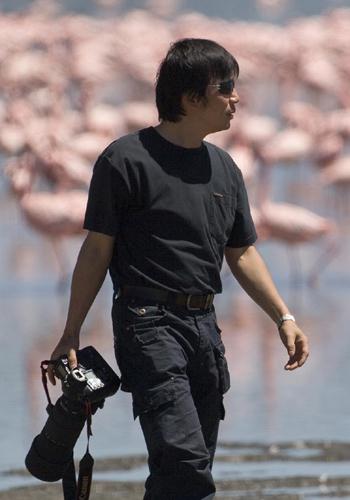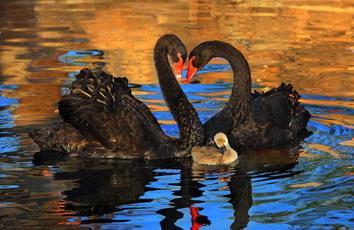
Luo Hong, president of Holiland, one of the largest bakery chains in China, taking pictures in Africa. He spends most of his waking day on photography and participating in charity activities around the world. [Provided to China Daily]
BEIJING - When Luo Hong couldn't find a decent cake for his mother's birthday he made a rather extravagant gesture.
The 23-year-old bought a bakery to ensure the problem would never happen again.
That was 18 years ago. Now, at the age of 41, Luo is president of Holiland, one of the largest bakery chains in China, and controls more than 1,000 cake shops in 70 cities including Beijing, Shanghai, Shenyang and Chengdu. They specialize in cakes, breads and dim sum and control 85.7 percent of the market.
This year the company is moving some stores from their original homes in the suburbs to downtown areas where the footfall is high enough to bring in even more customers.
Unlike other Chinese entrepreneurs whose names are often connected with their business, Luo is better known as a photographer, environmental campaigner and social activist.
He has spent most of his time during the last decade taking pictures and participating in charity events around the world, including the establishment of an environment protection fund for the UN Environmental Program.
Having just brought to a close an exhibition of his photographs at the UK's Cambridge University, he is now back in Beijing and keen to devote more time to his business.
"I can only award myself 50 points (out of 100) for the company's operation over these past 10 years and now it's time to return and work on Holiland's further development," Luo told China Business Weekly.


Using his photograph of the majestic bird for inspiration, Luo Hong's white swan cake will be introduced to the market during the second half of this year to diversify Holiland's portfolio of goods in the high-end market. The company introduces its black swan cake series to the market last year. [Provided to China Daily]
That isn't to say he has turned his back on photography. Returning with him is a picture he took of a swan on the River Cam in Cambridge which will be the inspiration for a new cake he intends to market later this year as part of his diversification into premium cake making.
It's Luo's belief that if a company doesn't have different brands to meet different customers' demands, it cannot be successful.
Following on the success of the black swan series, white swan cakes will feature top-class decorations and accessories. The price will be between 400 and 10,000 yuan, putting it into a class of its own. A cake weighing 1.5 pounds (0.68 kilograms) is priced at 469 yuan. At 21 cake, one of the most popular online cake shops, a cake weighing the same costs 169 yuan.
The wedding cake in the swan series will set customers back 10,000 yuan. Fittingly, as part of the service, it will be delivered to the wedding ceremony by Rolls Royce free of charge.
"Cakes and photography are two parallel interests in my life. Sometimes they cross paths. The launch of swan cakes is a combination of my business and personal interests," Luo said.
To make white swan cakes as exquisite as possible, Luo asked the developers to capture minute details from the queen of birds.
Luo is confident about the cake's sale prospects and expects they will account for 50 percent of Holiland's total annual revenues.
Luo says photography brings him happiness, inspiration for design and also a low-cost marketing strategy. Some of his photos adorn subway walls after the Beijing municipal government decided this year to improve the city's culture environment.
"It's good for our business," Luo said. "People who talk about the swan pictures will also be curious about my swan cakes."
Luo knows that in baking it is wise to follow produce what customers like best. One of his products featured a bear decoration but he got rid of it because some of his friends in the finance industry said it brought back unhappy memories of the bear market during the financial crisis last year.
As one of the largest cake shop chains, Holiland also faces the problem of "brain drain". The high turnover of skilled employees means that Holiland is always in danger of losing key intellectual capital in its core competency areas. The company needs to develop knowledge management strategies to capture, share, and preserve knowledge and integrate knowledge management into its strategic plans, said Luo.
This year, the entrepreneur paid 5 million yuan to American leadership expert, John C. Maxwell, to give a speech about leadership to all employees at Holiland on July 28 and 29 to improve the management skills of his employees.
Today's hurried urban life and the convenience of the Internet are luring more customers to online businesses, including bakeries, in China.
Luo and his team have joined the trend. All swan cakes are only accessible to online shoppers. The savings will be used to improve the product. It will come with a steel knife and fork rather than less environmentally-friendly plastic used previously.
Other bakery shops have also found that doing business online is less time-consuming and more economical. E-beecake, 21 cake and Waffleboy are among those becoming more popular with young people.
"Just like other industries, the bakery industry is also at a stage of change, reshuffling and upgrading, since ways of making money in the past are not as effective as before," said Chi Xiangdong, deputy chairman of the Bakery Industrial Association under the All-China Federation of Industry and Commerce.
Other traditional chains are also challenging Holiland's market position. Beijing-based Weiduomei is diversifying its business by opening three cafes and two Western-style restaurants. Bread Talk is focusing on gaining a foothold in high-end shopping malls and office buildings, reinforcing its niche image. Luo said: "Competition is good for the development of the cake market, which still has great potential."
Holiland is also expanding its portfolio of delicacies to include mooncakes and sweet dumplings. This autumn, the company will introduce a greater variety of mooncakes to attract more high-end customers. Holiland sold as much as 200 million yuan of mooncakes every year in China. According to Xie Li, general manager of Holiland, regular cakes, mooncakes and sweet dumpling are Holiland's best sellers, accounting for 60, 20 and 10 percent of the company's revenues respectively.
Zhao Liang of Cakeok.cn, a professional website for China's bakery sector, said the country's bakery market has grown 20 percent year-on-year over the past decade.





